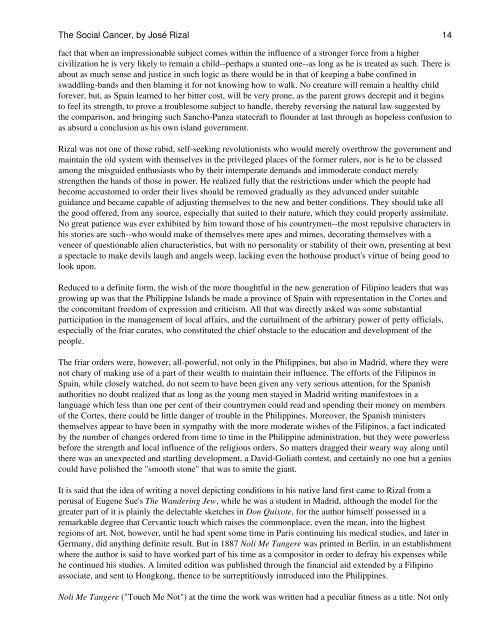The Social Cancer, by José Rizal - Home
The Social Cancer, by José Rizal - Home
The Social Cancer, by José Rizal - Home
Create successful ePaper yourself
Turn your PDF publications into a flip-book with our unique Google optimized e-Paper software.
<strong>The</strong> <strong>Social</strong> <strong>Cancer</strong>, <strong>by</strong> <strong>José</strong> <strong>Rizal</strong> 14<br />
fact that when an impressionable subject comes within the influence of a stronger force from a higher<br />
civilization he is very likely to remain a child--perhaps a stunted one--as long as he is treated as such. <strong>The</strong>re is<br />
about as much sense and justice in such logic as there would be in that of keeping a babe confined in<br />
swaddling-bands and then blaming it for not knowing how to walk. No creature will remain a healthy child<br />
forever, but, as Spain learned to her bitter cost, will be very prone, as the parent grows decrepit and it begins<br />
to feel its strength, to prove a troublesome subject to handle, there<strong>by</strong> reversing the natural law suggested <strong>by</strong><br />
the comparison, and bringing such Sancho-Panza statecraft to flounder at last through as hopeless confusion to<br />
as absurd a conclusion as his own island government.<br />
<strong>Rizal</strong> was not one of those rabid, self-seeking revolutionists who would merely overthrow the government and<br />
maintain the old system with themselves in the privileged places of the former rulers, nor is he to be classed<br />
among the misguided enthusiasts who <strong>by</strong> their intemperate demands and immoderate conduct merely<br />
strengthen the hands of those in power. He realized fully that the restrictions under which the people had<br />
become accustomed to order their lives should be removed gradually as they advanced under suitable<br />
guidance and became capable of adjusting themselves to the new and better conditions. <strong>The</strong>y should take all<br />
the good offered, from any source, especially that suited to their nature, which they could properly assimilate.<br />
No great patience was ever exhibited <strong>by</strong> him toward those of his countrymen--the most repulsive characters in<br />
his stories are such--who would make of themselves mere apes and mimes, decorating themselves with a<br />
veneer of questionable alien characteristics, but with no personality or stability of their own, presenting at best<br />
a spectacle to make devils laugh and angels weep, lacking even the hothouse product's virtue of being good to<br />
look upon.<br />
Reduced to a definite form, the wish of the more thoughtful in the new generation of Filipino leaders that was<br />
growing up was that the Philippine Islands be made a province of Spain with representation in the Cortes and<br />
the concomitant freedom of expression and criticism. All that was directly asked was some substantial<br />
participation in the management of local affairs, and the curtailment of the arbitrary power of petty officials,<br />
especially of the friar curates, who constituted the chief obstacle to the education and development of the<br />
people.<br />
<strong>The</strong> friar orders were, however, all-powerful, not only in the Philippines, but also in Madrid, where they were<br />
not chary of making use of a part of their wealth to maintain their influence. <strong>The</strong> efforts of the Filipinos in<br />
Spain, while closely watched, do not seem to have been given any very serious attention, for the Spanish<br />
authorities no doubt realized that as long as the young men stayed in Madrid writing manifestoes in a<br />
language which less than one per cent of their countrymen could read and spending their money on members<br />
of the Cortes, there could be little danger of trouble in the Philippines. Moreover, the Spanish ministers<br />
themselves appear to have been in sympathy with the more moderate wishes of the Filipinos, a fact indicated<br />
<strong>by</strong> the number of changes ordered from time to time in the Philippine administration, but they were powerless<br />
before the strength and local influence of the religious orders. So matters dragged their weary way along until<br />
there was an unexpected and startling development, a David-Goliath contest, and certainly no one but a genius<br />
could have polished the "smooth stone" that was to smite the giant.<br />
It is said that the idea of writing a novel depicting conditions in his native land first came to <strong>Rizal</strong> from a<br />
perusal of Eugene Sue's <strong>The</strong> Wandering Jew, while he was a student in Madrid, although the model for the<br />
greater part of it is plainly the delectable sketches in Don Quixote, for the author himself possessed in a<br />
remarkable degree that Cervantic touch which raises the commonplace, even the mean, into the highest<br />
regions of art. Not, however, until he had spent some time in Paris continuing his medical studies, and later in<br />
Germany, did anything definite result. But in 1887 Noli Me Tangere was printed in Berlin, in an establishment<br />
where the author is said to have worked part of his time as a compositor in order to defray his expenses while<br />
he continued his studies. A limited edition was published through the financial aid extended <strong>by</strong> a Filipino<br />
associate, and sent to Hongkong, thence to be surreptitiously introduced into the Philippines.<br />
Noli Me Tangere ("Touch Me Not") at the time the work was written had a peculiar fitness as a title. Not only


